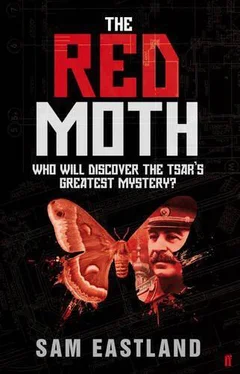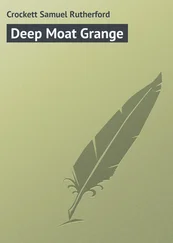Sam Eastland - Red Moth
Здесь есть возможность читать онлайн «Sam Eastland - Red Moth» весь текст электронной книги совершенно бесплатно (целиком полную версию без сокращений). В некоторых случаях можно слушать аудио, скачать через торрент в формате fb2 и присутствует краткое содержание. Жанр: Исторический детектив, на английском языке. Описание произведения, (предисловие) а так же отзывы посетителей доступны на портале библиотеки ЛибКат.
- Название:Red Moth
- Автор:
- Жанр:
- Год:неизвестен
- ISBN:нет данных
- Рейтинг книги:3 / 5. Голосов: 1
-
Избранное:Добавить в избранное
- Отзывы:
-
Ваша оценка:
- 60
- 1
- 2
- 3
- 4
- 5
Red Moth: краткое содержание, описание и аннотация
Предлагаем к чтению аннотацию, описание, краткое содержание или предисловие (зависит от того, что написал сам автор книги «Red Moth»). Если вы не нашли необходимую информацию о книге — напишите в комментариях, мы постараемся отыскать её.
Red Moth — читать онлайн бесплатно полную книгу (весь текст) целиком
Ниже представлен текст книги, разбитый по страницам. Система сохранения места последней прочитанной страницы, позволяет с удобством читать онлайн бесплатно книгу «Red Moth», без необходимости каждый раз заново искать на чём Вы остановились. Поставьте закладку, и сможете в любой момент перейти на страницу, на которой закончили чтение.
Интервал:
Закладка:
‘A demon or an angel. Who can say except the Tsar who summoned him?’
Even at that age, Stefanov knew that he and his father did not live in the same world. They might breathe the same air, and clean the same dirt off their shoes at the end of every day, but for Stefanov’s father, nothing was as it appeared. Each gust of wind, or rumble of thunder in the distance, or the body of a dead bird lying on the path, to be removed before the Tsar or any of his family could glimpse its crumpled form, represented a sign of what was to come. The Tsarskoye Selo estate, whose earth and stones and trees the man had tended for so long that he knew the grounds better than their owners ever could have done, was only a shadow to Stefanov’s father. Only the portents it contained were real, and deciphering them was his father’s only defence against the terrible randomness of life and death which he witnessed in the world around him.
The young Stefanov had already learned to see with different eyes. For him, sometimes thunder was just thunder, the wind only the wind, and the body of a bird no more than the trophy of a cat.
‘Summoned him from where?’ demanded Stefanov, in a tone that almost taunted the old man, knowing full well that such a challenge might cause his father’s patience to snap yet again, and that he would then be hauled from the fence and dragged behind the compost heap for punishment. But Stefanov was past caring about the half-hearted drubbings his father administered, slapping the young boy as if trying to beat the dust out of a carpet.
‘I’ll tell you where he came from.’ The father raised his hand‚ jabbing a dirt-rimmed fingernail towards the Catherine Palace. ‘From there. From that room!’
Stefanov gazed in bewilderment at the hundreds of windows, each one of which blankly returned his stare, hiding the dozens of rooms which lay behind them.
Sensing his son’s confusion, the father continued. ‘The room whose walls are made of fire.’
Stefanov had never heard of such a room, nor did he believe that one existed. It belonged, he felt sure, in that world of half-realities with which his father made sense of the universe. His father had never set foot inside the Catherine or Alexander Palaces. For a groundskeeper, their polished marble floors lay beyond the dimensions of his work. The closest he, or Stefanov, had ever come was the back door of the Alexander Palace kitchen, where he collected the midday meal to which he was entitled.
Suddenly Pekkala stopped in his tracks. The only movement was a wisp of dust, which swirled around his polished boots.
‘He’s turning around!’ hissed the father. ‘He’s coming back!’
Stefanov and his father scuttled back behind the hedge and waited. Stefanov placed his hand over his chest, as if to muffle the sound of his heart.
The dark figure passed by, half hidden by the bushes, but only an arm’s length away.
At that instant, Stefanov heard a voice which seemed to come from inside his own head.
‘Good day,’ said Inspector Pekkala.
And then he was gone.
At his first glance of Pekkala, Stefanov had wondered if, perhaps, there was nothing so magical about the great inspector as an extraordinary man doing his best to lead an ordinary life, out for a stroll at the end of a hard day’s work. But now that Pekkala had spoken, Stefanov wasn’t so sure. There was something about the Emerald Eye which did not seem fastened to the world of flesh and bone.
As the memory evaporated from his mind, Stefanov found himself once again in the filthy cocoon of his foxhole. Realising that the toy soldier was still in his hand, Stefanov stood the tiny warrior upright in the dirt, then settled back, arms folded across his chest, and studied the figure, as if, at any moment, he might march away to battles of his own.
The door to Pekkala’s office burst open
The door to Pekkala’s office burst open.
Pekkala was stooped over his desk studying a sketch he had made of the red moth painting before Kirov had taken it away to have the canvas X-rayed‚ along with the icon‚ which he planned to return to the museum. At first, Pekkala thought the major had returned, hopefully with news not only of the painting’s significance but also, perhaps, on the whereabouts of Polina Churikova. But his eyes narrowed with hostility when he saw who’d just stormed in.
It was a tall man with a black moustache and a pale, sweating forehead, who was dressed in the uniform of a high-ranking government official.
‘Bakhturin,’ muttered Pekkala.
‘People’s Commissar of the State Railways Bakhturin!’ He shook his fist at Pekkala. ‘Put some respect into your voice!’
‘I am not required to respect you,’ replied Pekkala, ‘and even if I was, I doubt you would find me convincing. Have you come about my visit to Semykin?’
‘As a matter of fact, yes, and to ask what you thought you were doing, speaking with a man whose sentence requires him to be kept in solitary confinement for the duration of his time in Lubyanka. That means no visitors. Not even you, Inspector!’
‘I was sorry to hear that the Wyspianski painting turned out to be a fake.’
‘Not a fake!’ snapped Bakhturin. ‘It was done in the style of Wyspianski, that is all.’
‘And was Wyspianski’s signature also done in the style of Wyspianski?’ asked Pekkala.
Bakhturin made a faint choking sound. ‘I spent a great deal of time and energy bringing that painting back from Poland and I brought it to Semykin because I’d heard he was the most reputable art dealer in Moscow. Is that so hard for you to understand?’
‘No,’ replied Pekkala, ‘but why is it so difficult for you to comprehend, Comrade Bakhturin, that the reason Semykin has such a good reputation is because he does not engage in the sale of paintings which are not authentic?’
Bakhturin began to pace back and forth, like a cat locked in a cage. ‘He could have kept his mouth shut. Instead of that, he practically announced in public that I was trying to cheat Minister Osipov.’
‘You mean you weren’t?’
‘I’m the one who was cheated! I didn’t know the painting wasn’t right.’
‘And when Semykin explained that to you. .’
‘By then it was too late! I had already borrowed money to pay for a dacha north of the city. I had to forfeit the contract. I lost a great deal of money thanks to that pompous art dealer.’
‘So you put him in prison.’
‘I could have done worse!’ bellowed Bakhturin. Then he paused for a moment, and when he spoke again, a sinister calm had entered his voice. ‘I did not come here to explain myself to you, Pekkala, only to advise you to keep your distance from Semykin. Remember what you saw in that prison cell today.’
Pekkala would never forget. More than the blood-dappled walls, or the ragged stumps of Semykin’s fingertips, or the choking sensation of confinement in that cell, it had been the look in Semykin’s eyes which bore witness to the full measure of Bakhturin’s cruelty. But Bakhturin had been wrong when he’d said that he could have done worse. For a man like Semykin, accustomed to spending his days surrounded by art, five years staring at the blank walls of a prison cell was worse than the deaths which Bakhturin’s other victims had suffered.
On his way out of the office, Bakhturin turned and aimed a finger at Pekkala. ‘You know what it means to be shut away in Lubyanka and you know it can happen to anyone. Anyone at all, Inspector.’
Pekkala managed to contain his irritation until Bakhturin had descended to the bottom of the stairs, before muttering a seemingly endless string of Finnish obscenities.
It was after dark
It was after dark when Kirov returned to the office.
Читать дальшеИнтервал:
Закладка:
Похожие книги на «Red Moth»
Представляем Вашему вниманию похожие книги на «Red Moth» списком для выбора. Мы отобрали схожую по названию и смыслу литературу в надежде предоставить читателям больше вариантов отыскать новые, интересные, ещё непрочитанные произведения.
Обсуждение, отзывы о книге «Red Moth» и просто собственные мнения читателей. Оставьте ваши комментарии, напишите, что Вы думаете о произведении, его смысле или главных героях. Укажите что конкретно понравилось, а что нет, и почему Вы так считаете.











